QL Bee's Global Business: Honey Market Analysis of France and Korea
VerifiedAdded on 2023/06/08
|12
|2681
|465
Report
AI Summary
This report provides a comprehensive analysis of the political, social, economic, and business environments of France and South Korea to determine the optimal market for QL Bee, an Australian honey firm, to expand its exports. It assesses the economic climates of both countries, highlighting their strengths and challenges based on indicators like GDP per capita, unemployment rate, and inflation rate. The report also examines the political settings, focusing on political risks and stability, and delves into the business environments, including ease of conducting business and market potential for honey. A weighted average method is used to compare the two countries based on factors such as market potential, economic position, trade relations, and political stability, ultimately recommending France as the more favorable market due to its strong honey market, high consumption rates, and the absence of a Free Trade Agreement between Australia and South Korea for honey products. The report concludes that while both countries present opportunities, France offers a more viable and profitable market for QL Bee's honey exports, emphasizing the need for effective marketing strategies and preparedness for potential political challenges.
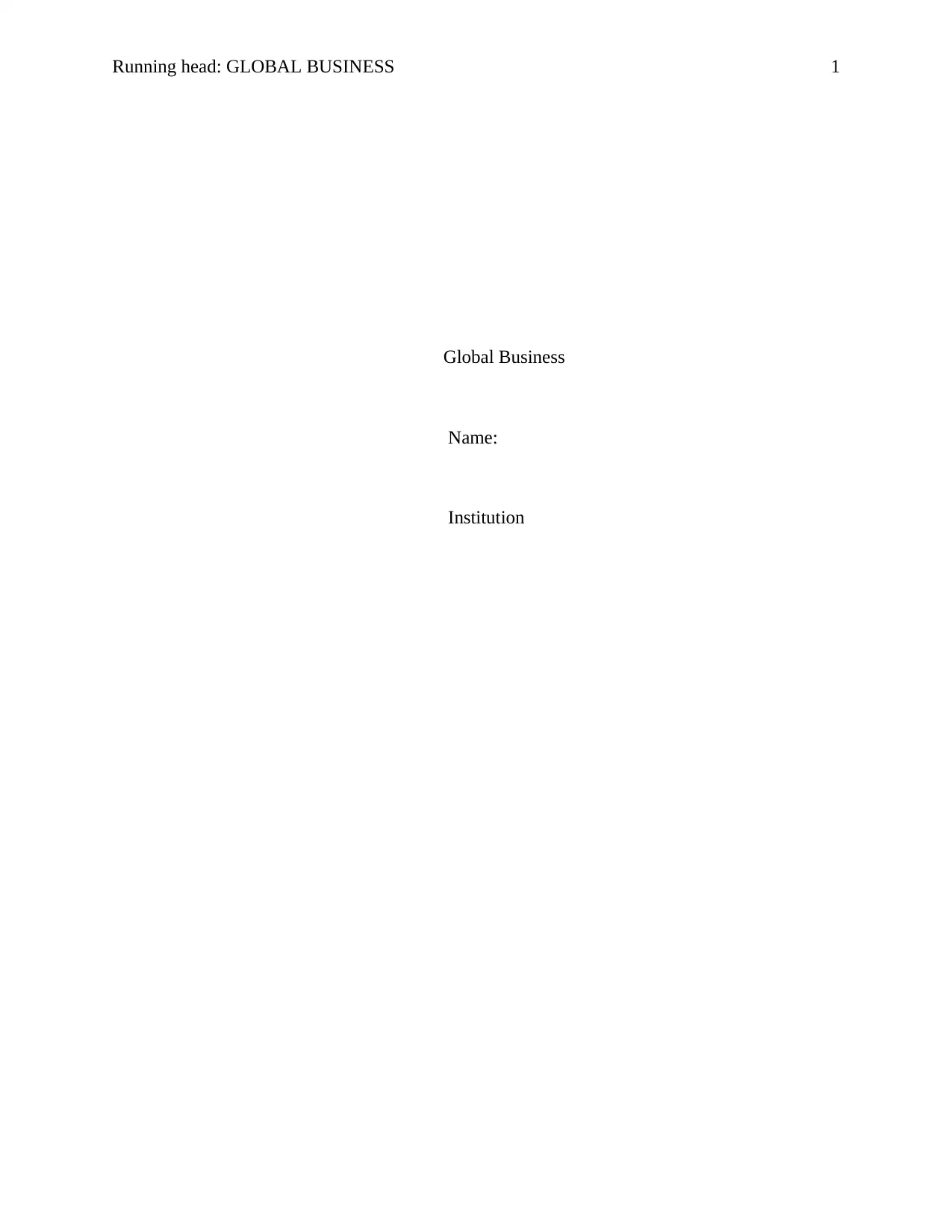
Running head: GLOBAL BUSINESS 1
Global Business
Name:
Institution
Global Business
Name:
Institution
Paraphrase This Document
Need a fresh take? Get an instant paraphrase of this document with our AI Paraphraser
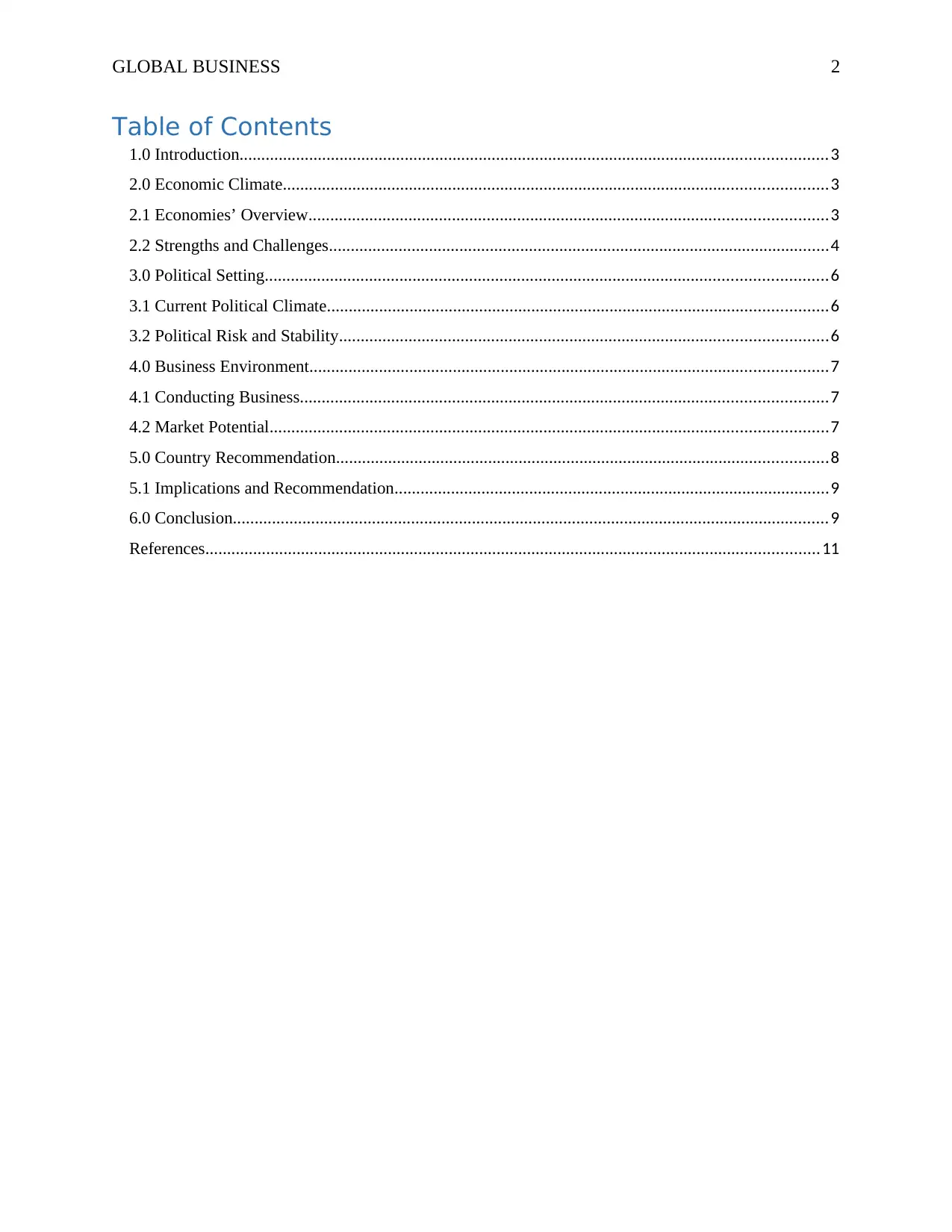
GLOBAL BUSINESS 2
Table of Contents
1.0 Introduction.......................................................................................................................................3
2.0 Economic Climate.............................................................................................................................3
2.1 Economies’ Overview.......................................................................................................................3
2.2 Strengths and Challenges...................................................................................................................4
3.0 Political Setting.................................................................................................................................6
3.1 Current Political Climate...................................................................................................................6
3.2 Political Risk and Stability................................................................................................................6
4.0 Business Environment.......................................................................................................................7
4.1 Conducting Business.........................................................................................................................7
4.2 Market Potential................................................................................................................................7
5.0 Country Recommendation.................................................................................................................8
5.1 Implications and Recommendation....................................................................................................9
6.0 Conclusion.........................................................................................................................................9
References.............................................................................................................................................11
Table of Contents
1.0 Introduction.......................................................................................................................................3
2.0 Economic Climate.............................................................................................................................3
2.1 Economies’ Overview.......................................................................................................................3
2.2 Strengths and Challenges...................................................................................................................4
3.0 Political Setting.................................................................................................................................6
3.1 Current Political Climate...................................................................................................................6
3.2 Political Risk and Stability................................................................................................................6
4.0 Business Environment.......................................................................................................................7
4.1 Conducting Business.........................................................................................................................7
4.2 Market Potential................................................................................................................................7
5.0 Country Recommendation.................................................................................................................8
5.1 Implications and Recommendation....................................................................................................9
6.0 Conclusion.........................................................................................................................................9
References.............................................................................................................................................11
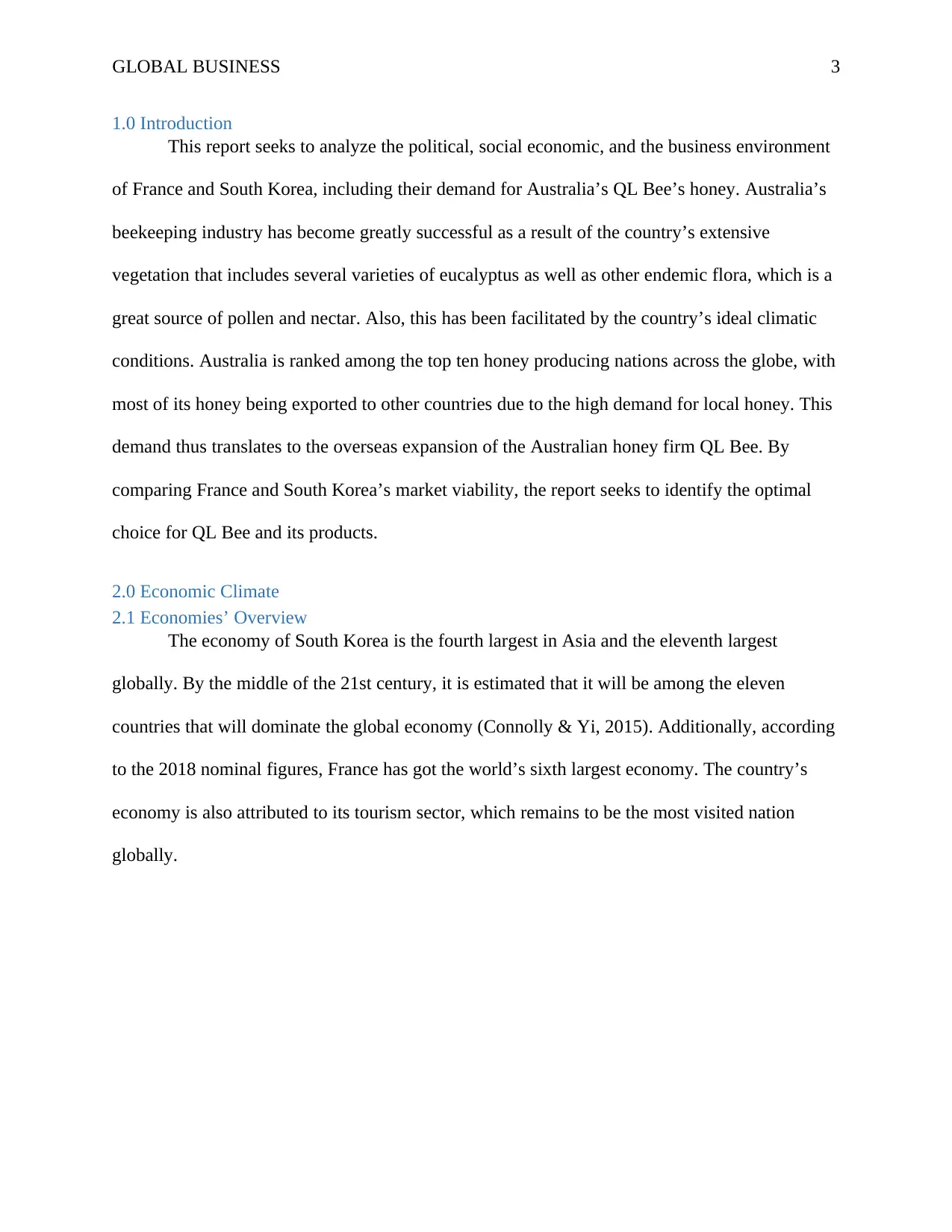
GLOBAL BUSINESS 3
1.0 Introduction
This report seeks to analyze the political, social economic, and the business environment
of France and South Korea, including their demand for Australia’s QL Bee’s honey. Australia’s
beekeeping industry has become greatly successful as a result of the country’s extensive
vegetation that includes several varieties of eucalyptus as well as other endemic flora, which is a
great source of pollen and nectar. Also, this has been facilitated by the country’s ideal climatic
conditions. Australia is ranked among the top ten honey producing nations across the globe, with
most of its honey being exported to other countries due to the high demand for local honey. This
demand thus translates to the overseas expansion of the Australian honey firm QL Bee. By
comparing France and South Korea’s market viability, the report seeks to identify the optimal
choice for QL Bee and its products.
2.0 Economic Climate
2.1 Economies’ Overview
The economy of South Korea is the fourth largest in Asia and the eleventh largest
globally. By the middle of the 21st century, it is estimated that it will be among the eleven
countries that will dominate the global economy (Connolly & Yi, 2015). Additionally, according
to the 2018 nominal figures, France has got the world’s sixth largest economy. The country’s
economy is also attributed to its tourism sector, which remains to be the most visited nation
globally.
1.0 Introduction
This report seeks to analyze the political, social economic, and the business environment
of France and South Korea, including their demand for Australia’s QL Bee’s honey. Australia’s
beekeeping industry has become greatly successful as a result of the country’s extensive
vegetation that includes several varieties of eucalyptus as well as other endemic flora, which is a
great source of pollen and nectar. Also, this has been facilitated by the country’s ideal climatic
conditions. Australia is ranked among the top ten honey producing nations across the globe, with
most of its honey being exported to other countries due to the high demand for local honey. This
demand thus translates to the overseas expansion of the Australian honey firm QL Bee. By
comparing France and South Korea’s market viability, the report seeks to identify the optimal
choice for QL Bee and its products.
2.0 Economic Climate
2.1 Economies’ Overview
The economy of South Korea is the fourth largest in Asia and the eleventh largest
globally. By the middle of the 21st century, it is estimated that it will be among the eleven
countries that will dominate the global economy (Connolly & Yi, 2015). Additionally, according
to the 2018 nominal figures, France has got the world’s sixth largest economy. The country’s
economy is also attributed to its tourism sector, which remains to be the most visited nation
globally.
⊘ This is a preview!⊘
Do you want full access?
Subscribe today to unlock all pages.

Trusted by 1+ million students worldwide
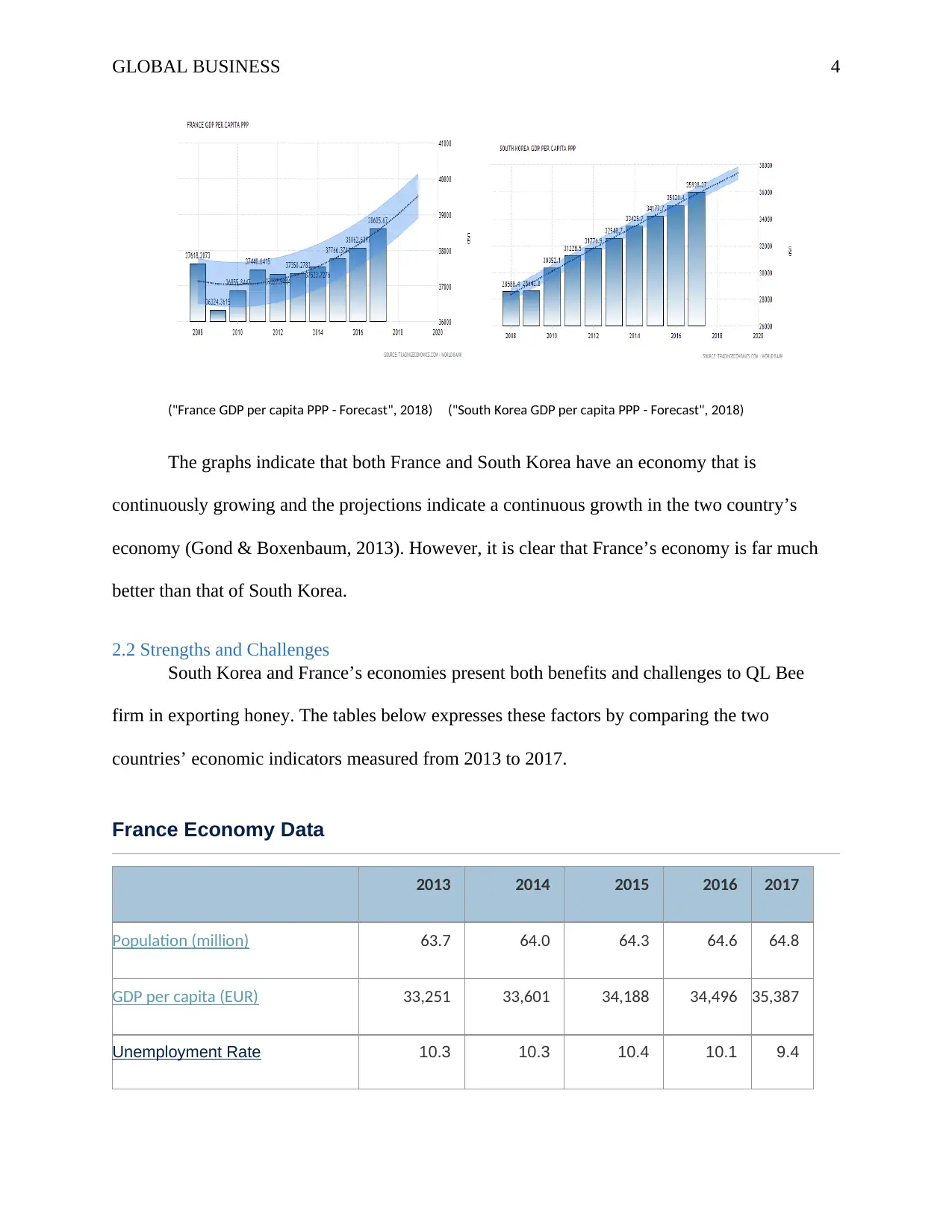
GLOBAL BUSINESS 4
("France GDP per capita PPP - Forecast", 2018) ("South Korea GDP per capita PPP - Forecast", 2018)
The graphs indicate that both France and South Korea have an economy that is
continuously growing and the projections indicate a continuous growth in the two country’s
economy (Gond & Boxenbaum, 2013). However, it is clear that France’s economy is far much
better than that of South Korea.
2.2 Strengths and Challenges
South Korea and France’s economies present both benefits and challenges to QL Bee
firm in exporting honey. The tables below expresses these factors by comparing the two
countries’ economic indicators measured from 2013 to 2017.
France Economy Data
2013 2014 2015 2016 2017
Population (million) 63.7 64.0 64.3 64.6 64.8
GDP per capita (EUR) 33,251 33,601 34,188 34,496 35,387
Unemployment Rate 10.3 10.3 10.4 10.1 9.4
("France GDP per capita PPP - Forecast", 2018) ("South Korea GDP per capita PPP - Forecast", 2018)
The graphs indicate that both France and South Korea have an economy that is
continuously growing and the projections indicate a continuous growth in the two country’s
economy (Gond & Boxenbaum, 2013). However, it is clear that France’s economy is far much
better than that of South Korea.
2.2 Strengths and Challenges
South Korea and France’s economies present both benefits and challenges to QL Bee
firm in exporting honey. The tables below expresses these factors by comparing the two
countries’ economic indicators measured from 2013 to 2017.
France Economy Data
2013 2014 2015 2016 2017
Population (million) 63.7 64.0 64.3 64.6 64.8
GDP per capita (EUR) 33,251 33,601 34,188 34,496 35,387
Unemployment Rate 10.3 10.3 10.4 10.1 9.4
Paraphrase This Document
Need a fresh take? Get an instant paraphrase of this document with our AI Paraphraser
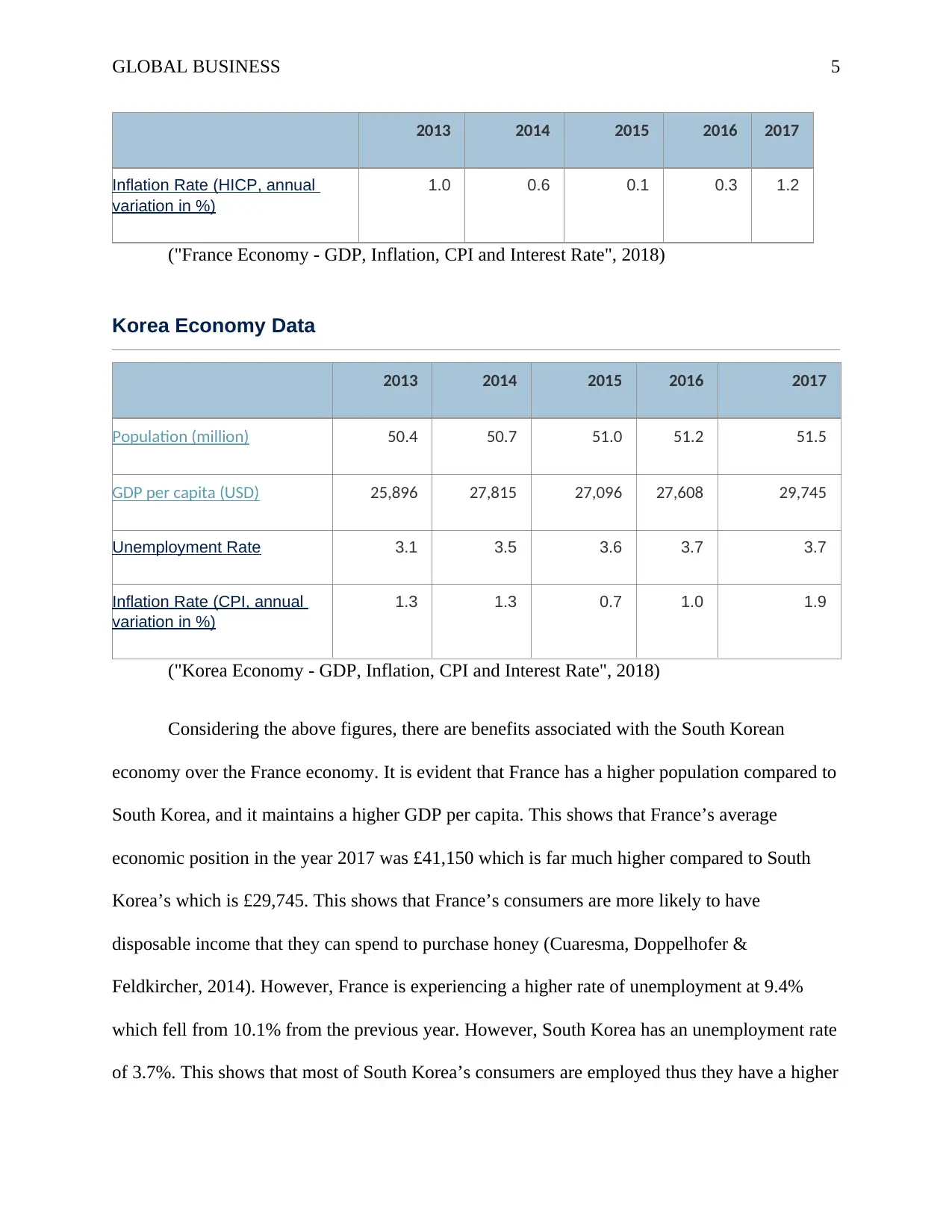
GLOBAL BUSINESS 5
2013 2014 2015 2016 2017
Inflation Rate (HICP, annual
variation in %)
1.0 0.6 0.1 0.3 1.2
("France Economy - GDP, Inflation, CPI and Interest Rate", 2018)
Korea Economy Data
2013 2014 2015 2016 2017
Population (million) 50.4 50.7 51.0 51.2 51.5
GDP per capita (USD) 25,896 27,815 27,096 27,608 29,745
Unemployment Rate 3.1 3.5 3.6 3.7 3.7
Inflation Rate (CPI, annual
variation in %)
1.3 1.3 0.7 1.0 1.9
("Korea Economy - GDP, Inflation, CPI and Interest Rate", 2018)
Considering the above figures, there are benefits associated with the South Korean
economy over the France economy. It is evident that France has a higher population compared to
South Korea, and it maintains a higher GDP per capita. This shows that France’s average
economic position in the year 2017 was £41,150 which is far much higher compared to South
Korea’s which is £29,745. This shows that France’s consumers are more likely to have
disposable income that they can spend to purchase honey (Cuaresma, Doppelhofer &
Feldkircher, 2014). However, France is experiencing a higher rate of unemployment at 9.4%
which fell from 10.1% from the previous year. However, South Korea has an unemployment rate
of 3.7%. This shows that most of South Korea’s consumers are employed thus they have a higher
2013 2014 2015 2016 2017
Inflation Rate (HICP, annual
variation in %)
1.0 0.6 0.1 0.3 1.2
("France Economy - GDP, Inflation, CPI and Interest Rate", 2018)
Korea Economy Data
2013 2014 2015 2016 2017
Population (million) 50.4 50.7 51.0 51.2 51.5
GDP per capita (USD) 25,896 27,815 27,096 27,608 29,745
Unemployment Rate 3.1 3.5 3.6 3.7 3.7
Inflation Rate (CPI, annual
variation in %)
1.3 1.3 0.7 1.0 1.9
("Korea Economy - GDP, Inflation, CPI and Interest Rate", 2018)
Considering the above figures, there are benefits associated with the South Korean
economy over the France economy. It is evident that France has a higher population compared to
South Korea, and it maintains a higher GDP per capita. This shows that France’s average
economic position in the year 2017 was £41,150 which is far much higher compared to South
Korea’s which is £29,745. This shows that France’s consumers are more likely to have
disposable income that they can spend to purchase honey (Cuaresma, Doppelhofer &
Feldkircher, 2014). However, France is experiencing a higher rate of unemployment at 9.4%
which fell from 10.1% from the previous year. However, South Korea has an unemployment rate
of 3.7%. This shows that most of South Korea’s consumers are employed thus they have a higher
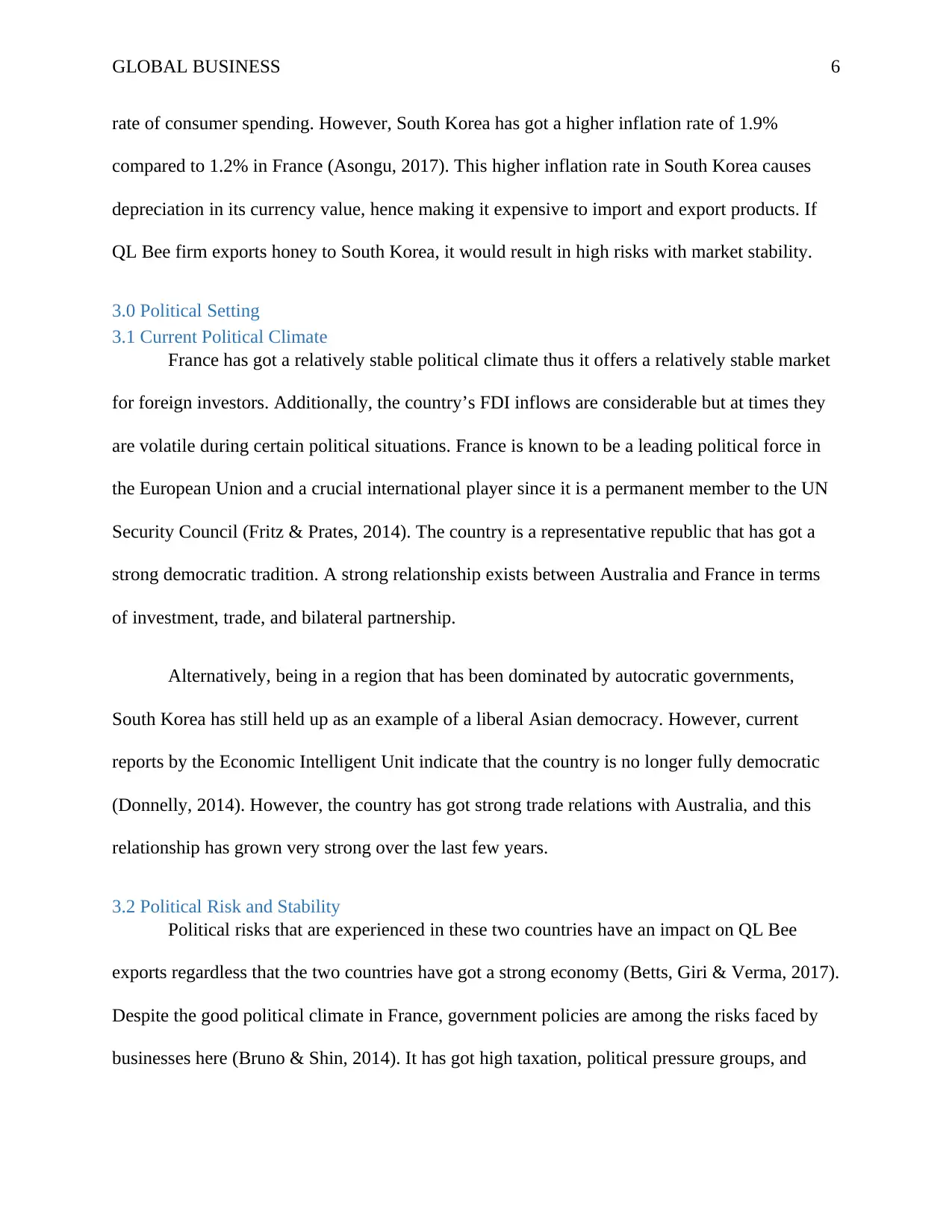
GLOBAL BUSINESS 6
rate of consumer spending. However, South Korea has got a higher inflation rate of 1.9%
compared to 1.2% in France (Asongu, 2017). This higher inflation rate in South Korea causes
depreciation in its currency value, hence making it expensive to import and export products. If
QL Bee firm exports honey to South Korea, it would result in high risks with market stability.
3.0 Political Setting
3.1 Current Political Climate
France has got a relatively stable political climate thus it offers a relatively stable market
for foreign investors. Additionally, the country’s FDI inflows are considerable but at times they
are volatile during certain political situations. France is known to be a leading political force in
the European Union and a crucial international player since it is a permanent member to the UN
Security Council (Fritz & Prates, 2014). The country is a representative republic that has got a
strong democratic tradition. A strong relationship exists between Australia and France in terms
of investment, trade, and bilateral partnership.
Alternatively, being in a region that has been dominated by autocratic governments,
South Korea has still held up as an example of a liberal Asian democracy. However, current
reports by the Economic Intelligent Unit indicate that the country is no longer fully democratic
(Donnelly, 2014). However, the country has got strong trade relations with Australia, and this
relationship has grown very strong over the last few years.
3.2 Political Risk and Stability
Political risks that are experienced in these two countries have an impact on QL Bee
exports regardless that the two countries have got a strong economy (Betts, Giri & Verma, 2017).
Despite the good political climate in France, government policies are among the risks faced by
businesses here (Bruno & Shin, 2014). It has got high taxation, political pressure groups, and
rate of consumer spending. However, South Korea has got a higher inflation rate of 1.9%
compared to 1.2% in France (Asongu, 2017). This higher inflation rate in South Korea causes
depreciation in its currency value, hence making it expensive to import and export products. If
QL Bee firm exports honey to South Korea, it would result in high risks with market stability.
3.0 Political Setting
3.1 Current Political Climate
France has got a relatively stable political climate thus it offers a relatively stable market
for foreign investors. Additionally, the country’s FDI inflows are considerable but at times they
are volatile during certain political situations. France is known to be a leading political force in
the European Union and a crucial international player since it is a permanent member to the UN
Security Council (Fritz & Prates, 2014). The country is a representative republic that has got a
strong democratic tradition. A strong relationship exists between Australia and France in terms
of investment, trade, and bilateral partnership.
Alternatively, being in a region that has been dominated by autocratic governments,
South Korea has still held up as an example of a liberal Asian democracy. However, current
reports by the Economic Intelligent Unit indicate that the country is no longer fully democratic
(Donnelly, 2014). However, the country has got strong trade relations with Australia, and this
relationship has grown very strong over the last few years.
3.2 Political Risk and Stability
Political risks that are experienced in these two countries have an impact on QL Bee
exports regardless that the two countries have got a strong economy (Betts, Giri & Verma, 2017).
Despite the good political climate in France, government policies are among the risks faced by
businesses here (Bruno & Shin, 2014). It has got high taxation, political pressure groups, and
⊘ This is a preview!⊘
Do you want full access?
Subscribe today to unlock all pages.

Trusted by 1+ million students worldwide
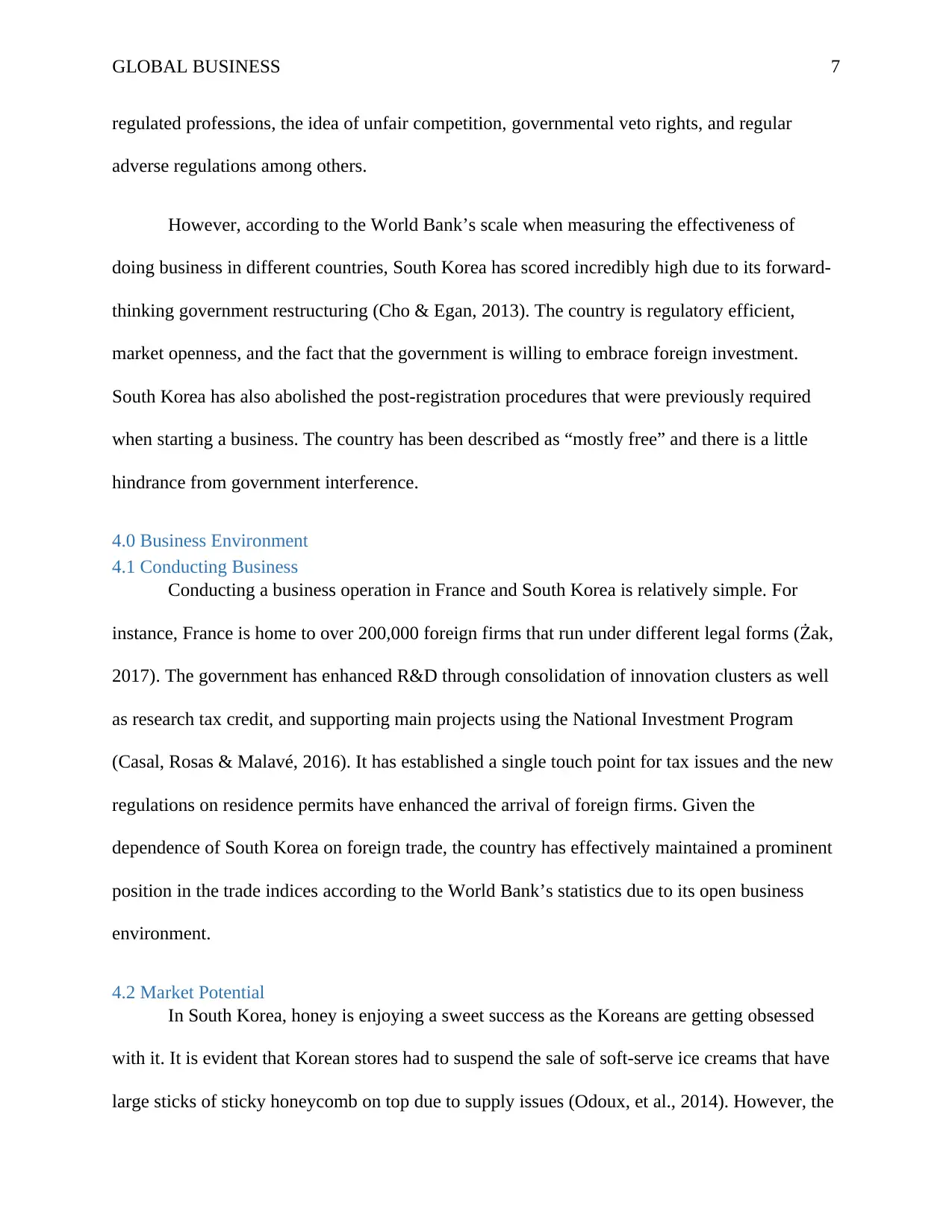
GLOBAL BUSINESS 7
regulated professions, the idea of unfair competition, governmental veto rights, and regular
adverse regulations among others.
However, according to the World Bank’s scale when measuring the effectiveness of
doing business in different countries, South Korea has scored incredibly high due to its forward-
thinking government restructuring (Cho & Egan, 2013). The country is regulatory efficient,
market openness, and the fact that the government is willing to embrace foreign investment.
South Korea has also abolished the post-registration procedures that were previously required
when starting a business. The country has been described as “mostly free” and there is a little
hindrance from government interference.
4.0 Business Environment
4.1 Conducting Business
Conducting a business operation in France and South Korea is relatively simple. For
instance, France is home to over 200,000 foreign firms that run under different legal forms (Żak,
2017). The government has enhanced R&D through consolidation of innovation clusters as well
as research tax credit, and supporting main projects using the National Investment Program
(Casal, Rosas & Malavé, 2016). It has established a single touch point for tax issues and the new
regulations on residence permits have enhanced the arrival of foreign firms. Given the
dependence of South Korea on foreign trade, the country has effectively maintained a prominent
position in the trade indices according to the World Bank’s statistics due to its open business
environment.
4.2 Market Potential
In South Korea, honey is enjoying a sweet success as the Koreans are getting obsessed
with it. It is evident that Korean stores had to suspend the sale of soft-serve ice creams that have
large sticks of sticky honeycomb on top due to supply issues (Odoux, et al., 2014). However, the
regulated professions, the idea of unfair competition, governmental veto rights, and regular
adverse regulations among others.
However, according to the World Bank’s scale when measuring the effectiveness of
doing business in different countries, South Korea has scored incredibly high due to its forward-
thinking government restructuring (Cho & Egan, 2013). The country is regulatory efficient,
market openness, and the fact that the government is willing to embrace foreign investment.
South Korea has also abolished the post-registration procedures that were previously required
when starting a business. The country has been described as “mostly free” and there is a little
hindrance from government interference.
4.0 Business Environment
4.1 Conducting Business
Conducting a business operation in France and South Korea is relatively simple. For
instance, France is home to over 200,000 foreign firms that run under different legal forms (Żak,
2017). The government has enhanced R&D through consolidation of innovation clusters as well
as research tax credit, and supporting main projects using the National Investment Program
(Casal, Rosas & Malavé, 2016). It has established a single touch point for tax issues and the new
regulations on residence permits have enhanced the arrival of foreign firms. Given the
dependence of South Korea on foreign trade, the country has effectively maintained a prominent
position in the trade indices according to the World Bank’s statistics due to its open business
environment.
4.2 Market Potential
In South Korea, honey is enjoying a sweet success as the Koreans are getting obsessed
with it. It is evident that Korean stores had to suspend the sale of soft-serve ice creams that have
large sticks of sticky honeycomb on top due to supply issues (Odoux, et al., 2014). However, the
Paraphrase This Document
Need a fresh take? Get an instant paraphrase of this document with our AI Paraphraser
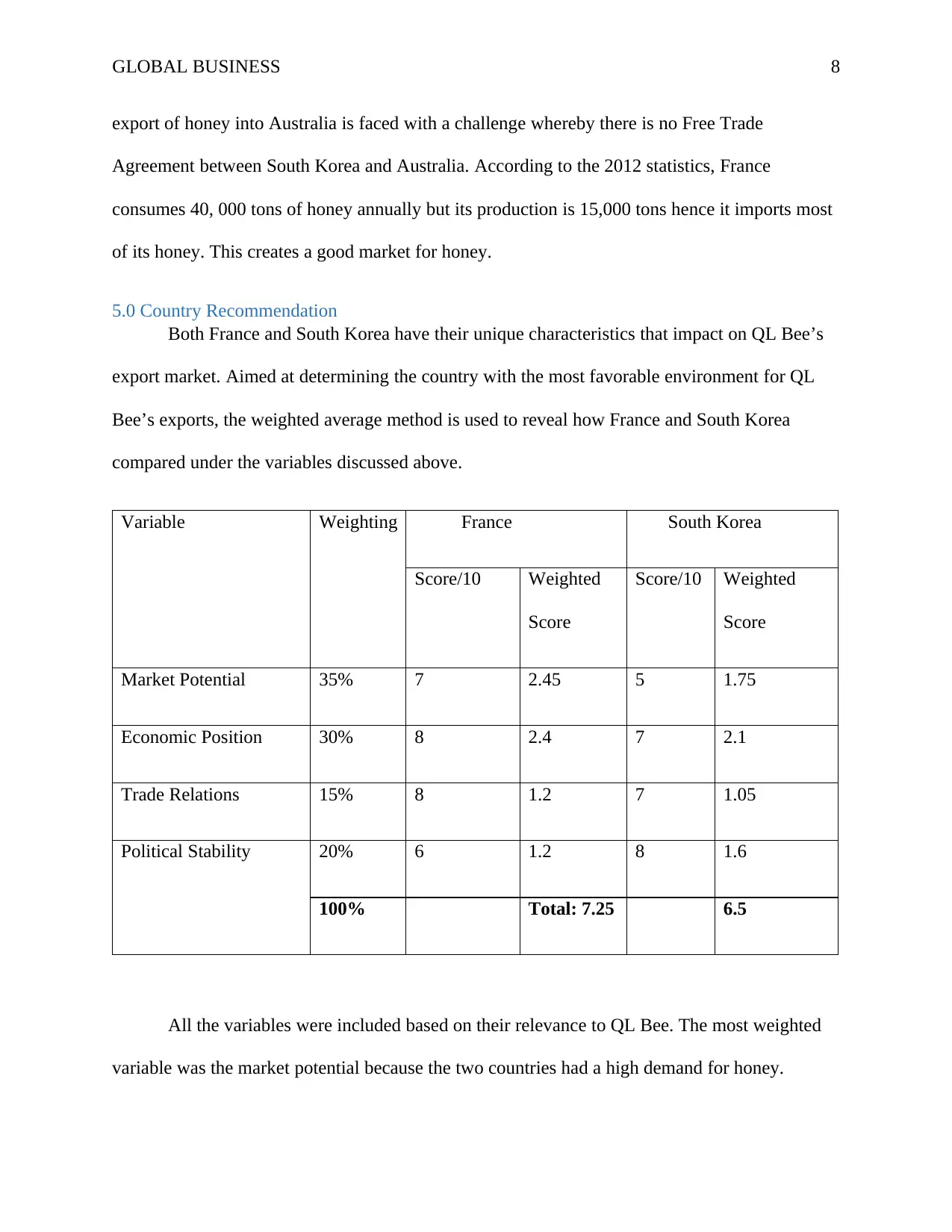
GLOBAL BUSINESS 8
export of honey into Australia is faced with a challenge whereby there is no Free Trade
Agreement between South Korea and Australia. According to the 2012 statistics, France
consumes 40, 000 tons of honey annually but its production is 15,000 tons hence it imports most
of its honey. This creates a good market for honey.
5.0 Country Recommendation
Both France and South Korea have their unique characteristics that impact on QL Bee’s
export market. Aimed at determining the country with the most favorable environment for QL
Bee’s exports, the weighted average method is used to reveal how France and South Korea
compared under the variables discussed above.
Variable Weighting France South Korea
Score/10 Weighted
Score
Score/10 Weighted
Score
Market Potential 35% 7 2.45 5 1.75
Economic Position 30% 8 2.4 7 2.1
Trade Relations 15% 8 1.2 7 1.05
Political Stability 20% 6 1.2 8 1.6
100% Total: 7.25 6.5
All the variables were included based on their relevance to QL Bee. The most weighted
variable was the market potential because the two countries had a high demand for honey.
export of honey into Australia is faced with a challenge whereby there is no Free Trade
Agreement between South Korea and Australia. According to the 2012 statistics, France
consumes 40, 000 tons of honey annually but its production is 15,000 tons hence it imports most
of its honey. This creates a good market for honey.
5.0 Country Recommendation
Both France and South Korea have their unique characteristics that impact on QL Bee’s
export market. Aimed at determining the country with the most favorable environment for QL
Bee’s exports, the weighted average method is used to reveal how France and South Korea
compared under the variables discussed above.
Variable Weighting France South Korea
Score/10 Weighted
Score
Score/10 Weighted
Score
Market Potential 35% 7 2.45 5 1.75
Economic Position 30% 8 2.4 7 2.1
Trade Relations 15% 8 1.2 7 1.05
Political Stability 20% 6 1.2 8 1.6
100% Total: 7.25 6.5
All the variables were included based on their relevance to QL Bee. The most weighted
variable was the market potential because the two countries had a high demand for honey.
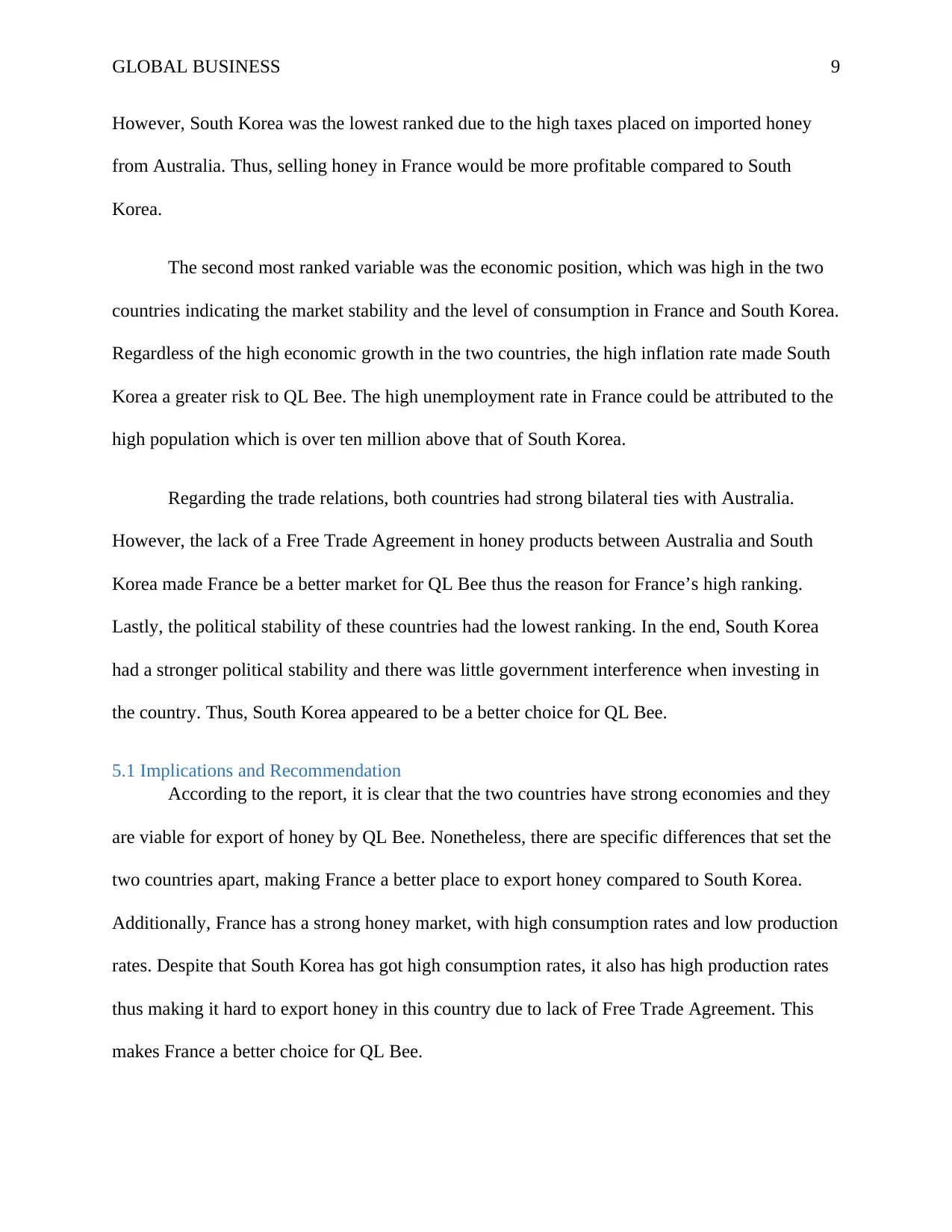
GLOBAL BUSINESS 9
However, South Korea was the lowest ranked due to the high taxes placed on imported honey
from Australia. Thus, selling honey in France would be more profitable compared to South
Korea.
The second most ranked variable was the economic position, which was high in the two
countries indicating the market stability and the level of consumption in France and South Korea.
Regardless of the high economic growth in the two countries, the high inflation rate made South
Korea a greater risk to QL Bee. The high unemployment rate in France could be attributed to the
high population which is over ten million above that of South Korea.
Regarding the trade relations, both countries had strong bilateral ties with Australia.
However, the lack of a Free Trade Agreement in honey products between Australia and South
Korea made France be a better market for QL Bee thus the reason for France’s high ranking.
Lastly, the political stability of these countries had the lowest ranking. In the end, South Korea
had a stronger political stability and there was little government interference when investing in
the country. Thus, South Korea appeared to be a better choice for QL Bee.
5.1 Implications and Recommendation
According to the report, it is clear that the two countries have strong economies and they
are viable for export of honey by QL Bee. Nonetheless, there are specific differences that set the
two countries apart, making France a better place to export honey compared to South Korea.
Additionally, France has a strong honey market, with high consumption rates and low production
rates. Despite that South Korea has got high consumption rates, it also has high production rates
thus making it hard to export honey in this country due to lack of Free Trade Agreement. This
makes France a better choice for QL Bee.
However, South Korea was the lowest ranked due to the high taxes placed on imported honey
from Australia. Thus, selling honey in France would be more profitable compared to South
Korea.
The second most ranked variable was the economic position, which was high in the two
countries indicating the market stability and the level of consumption in France and South Korea.
Regardless of the high economic growth in the two countries, the high inflation rate made South
Korea a greater risk to QL Bee. The high unemployment rate in France could be attributed to the
high population which is over ten million above that of South Korea.
Regarding the trade relations, both countries had strong bilateral ties with Australia.
However, the lack of a Free Trade Agreement in honey products between Australia and South
Korea made France be a better market for QL Bee thus the reason for France’s high ranking.
Lastly, the political stability of these countries had the lowest ranking. In the end, South Korea
had a stronger political stability and there was little government interference when investing in
the country. Thus, South Korea appeared to be a better choice for QL Bee.
5.1 Implications and Recommendation
According to the report, it is clear that the two countries have strong economies and they
are viable for export of honey by QL Bee. Nonetheless, there are specific differences that set the
two countries apart, making France a better place to export honey compared to South Korea.
Additionally, France has a strong honey market, with high consumption rates and low production
rates. Despite that South Korea has got high consumption rates, it also has high production rates
thus making it hard to export honey in this country due to lack of Free Trade Agreement. This
makes France a better choice for QL Bee.
⊘ This is a preview!⊘
Do you want full access?
Subscribe today to unlock all pages.

Trusted by 1+ million students worldwide
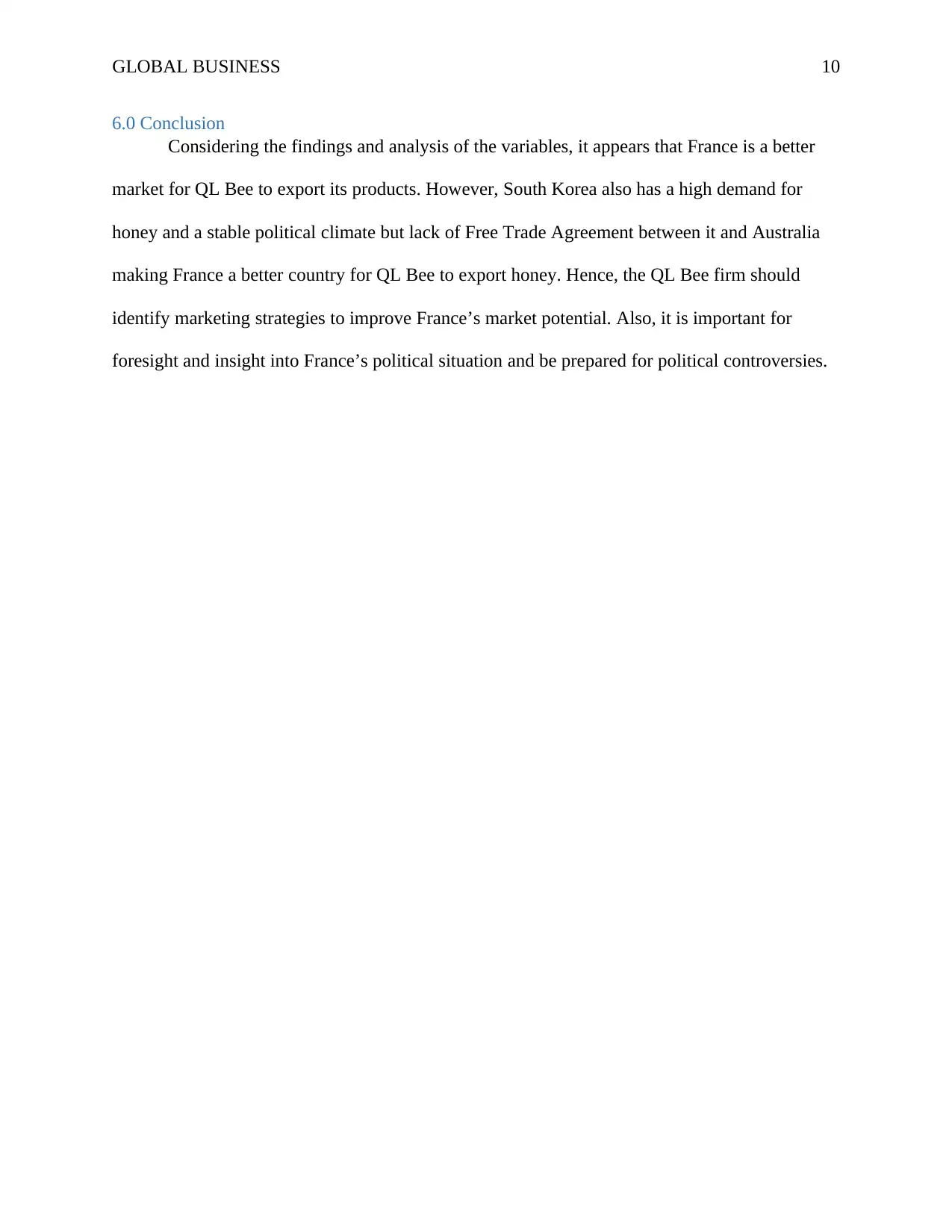
GLOBAL BUSINESS 10
6.0 Conclusion
Considering the findings and analysis of the variables, it appears that France is a better
market for QL Bee to export its products. However, South Korea also has a high demand for
honey and a stable political climate but lack of Free Trade Agreement between it and Australia
making France a better country for QL Bee to export honey. Hence, the QL Bee firm should
identify marketing strategies to improve France’s market potential. Also, it is important for
foresight and insight into France’s political situation and be prepared for political controversies.
6.0 Conclusion
Considering the findings and analysis of the variables, it appears that France is a better
market for QL Bee to export its products. However, South Korea also has a high demand for
honey and a stable political climate but lack of Free Trade Agreement between it and Australia
making France a better country for QL Bee to export honey. Hence, the QL Bee firm should
identify marketing strategies to improve France’s market potential. Also, it is important for
foresight and insight into France’s political situation and be prepared for political controversies.
Paraphrase This Document
Need a fresh take? Get an instant paraphrase of this document with our AI Paraphraser
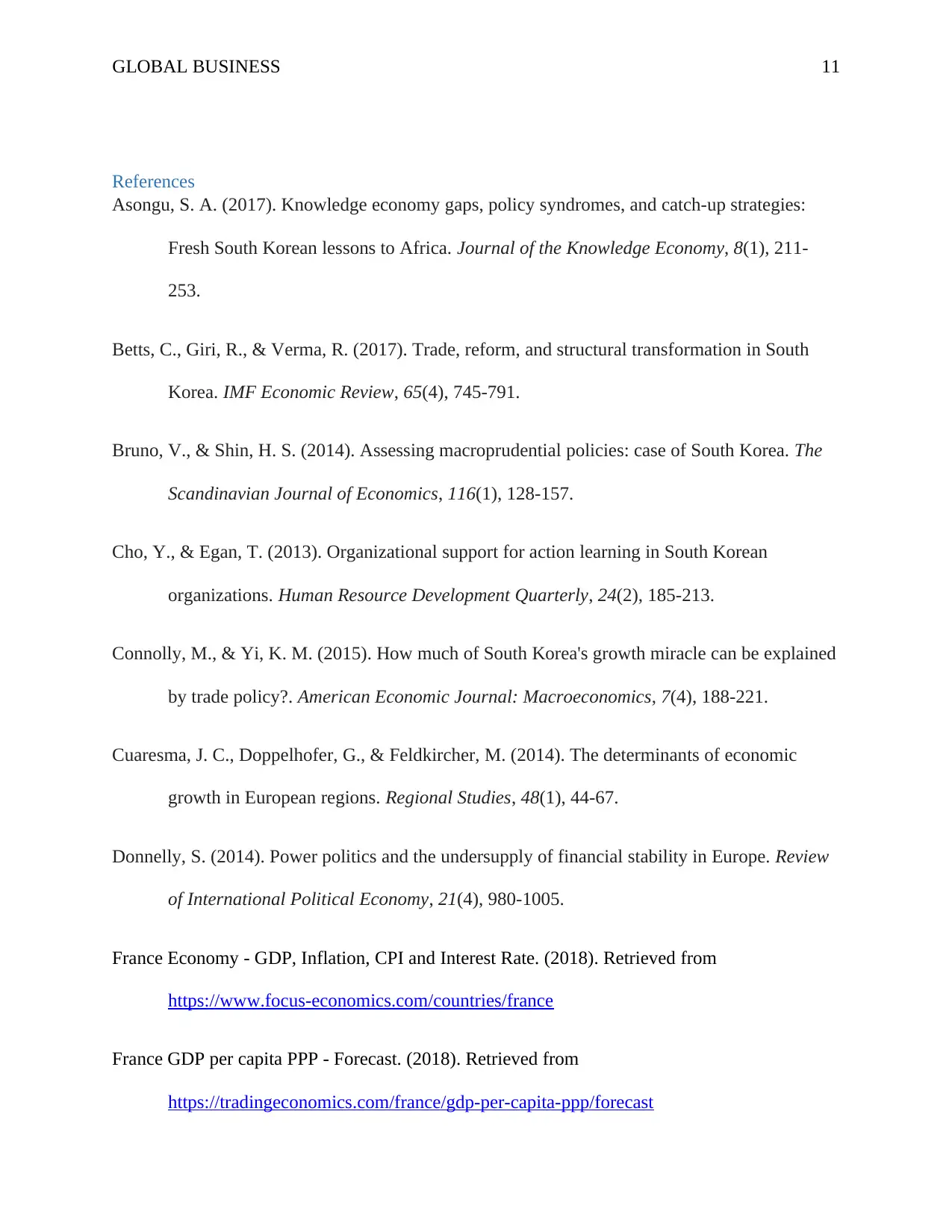
GLOBAL BUSINESS 11
References
Asongu, S. A. (2017). Knowledge economy gaps, policy syndromes, and catch-up strategies:
Fresh South Korean lessons to Africa. Journal of the Knowledge Economy, 8(1), 211-
253.
Betts, C., Giri, R., & Verma, R. (2017). Trade, reform, and structural transformation in South
Korea. IMF Economic Review, 65(4), 745-791.
Bruno, V., & Shin, H. S. (2014). Assessing macroprudential policies: case of South Korea. The
Scandinavian Journal of Economics, 116(1), 128-157.
Cho, Y., & Egan, T. (2013). Organizational support for action learning in South Korean
organizations. Human Resource Development Quarterly, 24(2), 185-213.
Connolly, M., & Yi, K. M. (2015). How much of South Korea's growth miracle can be explained
by trade policy?. American Economic Journal: Macroeconomics, 7(4), 188-221.
Cuaresma, J. C., Doppelhofer, G., & Feldkircher, M. (2014). The determinants of economic
growth in European regions. Regional Studies, 48(1), 44-67.
Donnelly, S. (2014). Power politics and the undersupply of financial stability in Europe. Review
of International Political Economy, 21(4), 980-1005.
France Economy - GDP, Inflation, CPI and Interest Rate. (2018). Retrieved from
https://www.focus-economics.com/countries/france
France GDP per capita PPP - Forecast. (2018). Retrieved from
https://tradingeconomics.com/france/gdp-per-capita-ppp/forecast
References
Asongu, S. A. (2017). Knowledge economy gaps, policy syndromes, and catch-up strategies:
Fresh South Korean lessons to Africa. Journal of the Knowledge Economy, 8(1), 211-
253.
Betts, C., Giri, R., & Verma, R. (2017). Trade, reform, and structural transformation in South
Korea. IMF Economic Review, 65(4), 745-791.
Bruno, V., & Shin, H. S. (2014). Assessing macroprudential policies: case of South Korea. The
Scandinavian Journal of Economics, 116(1), 128-157.
Cho, Y., & Egan, T. (2013). Organizational support for action learning in South Korean
organizations. Human Resource Development Quarterly, 24(2), 185-213.
Connolly, M., & Yi, K. M. (2015). How much of South Korea's growth miracle can be explained
by trade policy?. American Economic Journal: Macroeconomics, 7(4), 188-221.
Cuaresma, J. C., Doppelhofer, G., & Feldkircher, M. (2014). The determinants of economic
growth in European regions. Regional Studies, 48(1), 44-67.
Donnelly, S. (2014). Power politics and the undersupply of financial stability in Europe. Review
of International Political Economy, 21(4), 980-1005.
France Economy - GDP, Inflation, CPI and Interest Rate. (2018). Retrieved from
https://www.focus-economics.com/countries/france
France GDP per capita PPP - Forecast. (2018). Retrieved from
https://tradingeconomics.com/france/gdp-per-capita-ppp/forecast
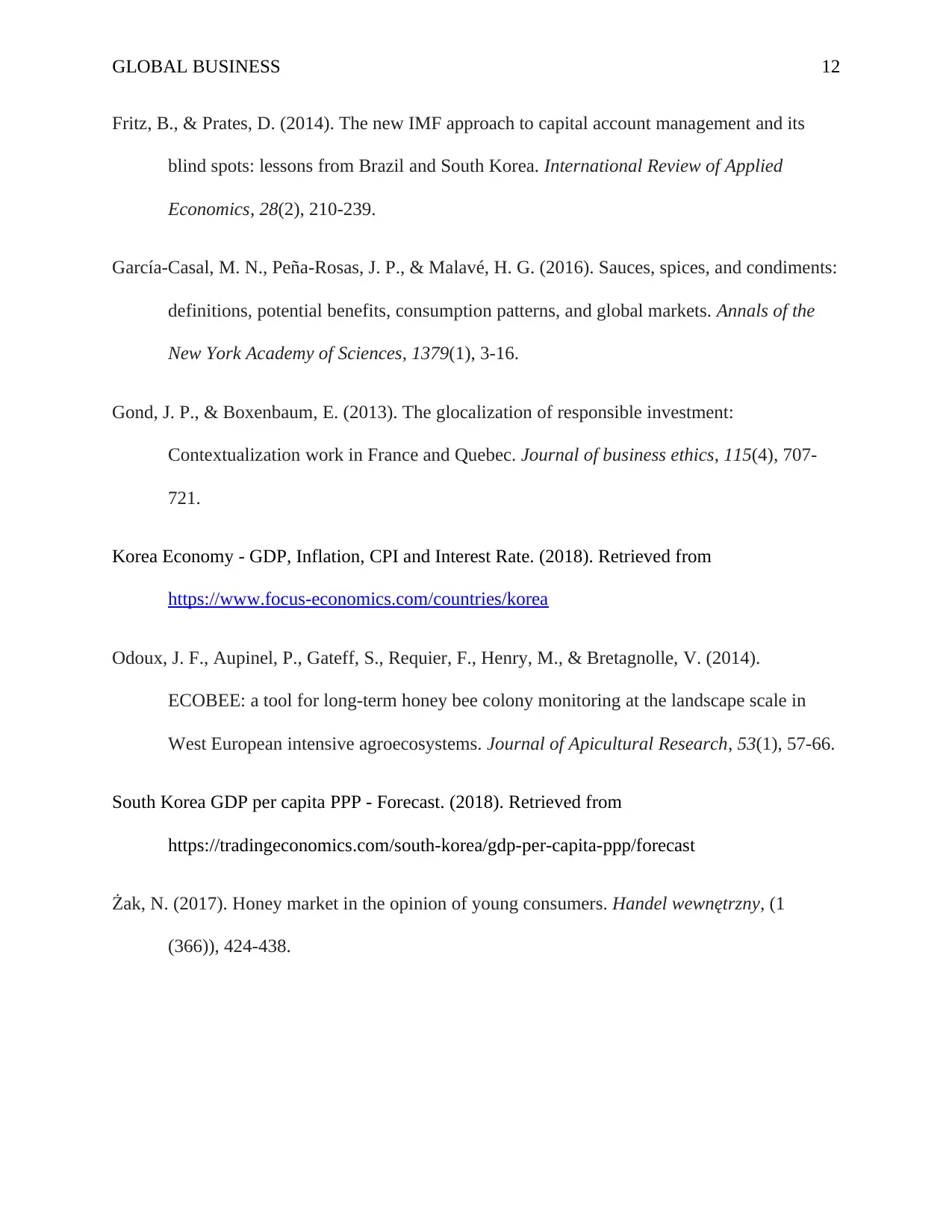
GLOBAL BUSINESS 12
Fritz, B., & Prates, D. (2014). The new IMF approach to capital account management and its
blind spots: lessons from Brazil and South Korea. International Review of Applied
Economics, 28(2), 210-239.
García‐Casal, M. N., Peña‐Rosas, J. P., & Malavé, H. G. (2016). Sauces, spices, and condiments:
definitions, potential benefits, consumption patterns, and global markets. Annals of the
New York Academy of Sciences, 1379(1), 3-16.
Gond, J. P., & Boxenbaum, E. (2013). The glocalization of responsible investment:
Contextualization work in France and Quebec. Journal of business ethics, 115(4), 707-
721.
Korea Economy - GDP, Inflation, CPI and Interest Rate. (2018). Retrieved from
https://www.focus-economics.com/countries/korea
Odoux, J. F., Aupinel, P., Gateff, S., Requier, F., Henry, M., & Bretagnolle, V. (2014).
ECOBEE: a tool for long-term honey bee colony monitoring at the landscape scale in
West European intensive agroecosystems. Journal of Apicultural Research, 53(1), 57-66.
South Korea GDP per capita PPP - Forecast. (2018). Retrieved from
https://tradingeconomics.com/south-korea/gdp-per-capita-ppp/forecast
Żak, N. (2017). Honey market in the opinion of young consumers. Handel wewnętrzny, (1
(366)), 424-438.
Fritz, B., & Prates, D. (2014). The new IMF approach to capital account management and its
blind spots: lessons from Brazil and South Korea. International Review of Applied
Economics, 28(2), 210-239.
García‐Casal, M. N., Peña‐Rosas, J. P., & Malavé, H. G. (2016). Sauces, spices, and condiments:
definitions, potential benefits, consumption patterns, and global markets. Annals of the
New York Academy of Sciences, 1379(1), 3-16.
Gond, J. P., & Boxenbaum, E. (2013). The glocalization of responsible investment:
Contextualization work in France and Quebec. Journal of business ethics, 115(4), 707-
721.
Korea Economy - GDP, Inflation, CPI and Interest Rate. (2018). Retrieved from
https://www.focus-economics.com/countries/korea
Odoux, J. F., Aupinel, P., Gateff, S., Requier, F., Henry, M., & Bretagnolle, V. (2014).
ECOBEE: a tool for long-term honey bee colony monitoring at the landscape scale in
West European intensive agroecosystems. Journal of Apicultural Research, 53(1), 57-66.
South Korea GDP per capita PPP - Forecast. (2018). Retrieved from
https://tradingeconomics.com/south-korea/gdp-per-capita-ppp/forecast
Żak, N. (2017). Honey market in the opinion of young consumers. Handel wewnętrzny, (1
(366)), 424-438.
⊘ This is a preview!⊘
Do you want full access?
Subscribe today to unlock all pages.

Trusted by 1+ million students worldwide
1 out of 12
Related Documents
Your All-in-One AI-Powered Toolkit for Academic Success.
+13062052269
info@desklib.com
Available 24*7 on WhatsApp / Email
![[object Object]](/_next/static/media/star-bottom.7253800d.svg)
Unlock your academic potential
Copyright © 2020–2026 A2Z Services. All Rights Reserved. Developed and managed by ZUCOL.





